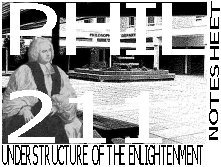 Kant 3
Kant 3 Kant 3
Kant 3Experience must include awareness of objects which are distinguishable from experiences of them in the sense that judgements about these objects are judgements about what is the case irrespective of the actual occurrence of particular subjective experiences of them. (Strawson's formulation.)
Experience essentially exhibits temporal succession.
(Strawson's formulation)
There must be such unity among the members of some temporally extended series of experiences as is required for the possibility of self-consciousness, or self-ascription of experiences, on the part of a subject of such experiences. (Strawson's formulation)
Could there be an experience without the experience belonging to something?
Scruton's gloss: 'There is contained in every thought, as of every mental content, the notion of a subject.'
The thesis of objectivity is connected to the thesis of the necessary unity of consciousness in the following way: You can't have unity of consciousness unless you think of your experience as experience of an objective world.
Interpreting the thesis of objectivity:
Two claims, austere and meaty.
The meaty interpretation of the thesis of objectivity is that there must be an objective world.
The austere interpretation says this: To have experience at all we have to conceive of ourselves as relating to a world independent of us.
Here is Strawson picking out what he thinks of as the bones of Kant's discussion.
'Experience must include awareness of objects which are distinguishable from experiences of them in the sense that judgements about these objects are judgements about what is the case irrespective of the actual occurrence of particular subjective experiences of them.' (Strawson, The Bounds of Sense, p.97)
Strawson hints at an argument when he says:
'For a series of diverse experiences to belong to a single consciousness it is necessary that they should be so connected as to constitute a temporally extended experience of a unified objective world.' (Strawson, The Bounds of Sense, p.97.)
Can this hint be developed?
Kant's attempt is apparently to argue that we couldn't have any experience at all unless we
owned our experiences
and we would not be able to own experiences unless we
belonged to an objective world (meaty)
or
conceived of ourselves as belonging to an objective world (austere)
What more bits of argumentation can e got out of the Transcendental Deduction which help put flesh on this bare outline?
VP